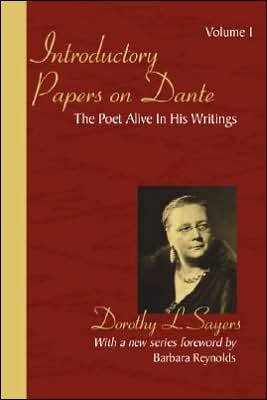

 |

|

The average rating for Introductory Papers on Dante: Volume 1: The Poet Alive in His Writings based on 2 reviews is 4.5 stars.
Review # 1 was written on 2016-08-13 00:00:00 Amanda Tarter Amanda TarterSayers has provided an excellent work of commentary that serves as a fine introduction to the student of Dante's Divina Commedia. While periodically digressing into matters of greater interest to her academic audience than the general reader would appreciate, this collection of essays offers guidelines on how to read Dante fruitfully, common pitfalls to avoid, and the theological context in which Dante was operating. On numerous occasions, her attentive reading offered solutions to questions of which I, as a casual enthusiast, was unaware--making her insights doubly valuable. Of particular assistance to me were the chapters entitled "The Meaning of Heaven and Hell," "The Meaning of Purgatory," "The City of Dis," and "The Fourfold Interpretation of the Comedy". They dwell upon innumerable examples from the text itself, opening up into broader discussions that incorporate not only poetic but structural insights, so crucial to making sense of Dante's world. For instance, in "The City of Dis," Sayers puzzles over the organization of the Inferno. Why are certain sins assigned to rather surprising places--as, for instance, the placement of grafters in a more serious place of punishment than the sellers of ecclesiastical office, the latter seeming far more grave a betrayal? And why are the counterfeiters punished more grievously than suicides, the violent, and the adulterous, in the deepest round of the eight circle? Sayers unfolds her discovery that the Inferno is as much a narrative of the progress of individual and social sin as it is a classification of those sins--that Dante is, in a sense, suffering the progress of sin in its most unabated form, from intemperance to malice to fraud. That is its basic pattern in the world, and when things have gotten so bad within the human community that the most basic means of interpersonal exchange--money--is no longer trustworthy, surely the last vestiges of love have been trampled into unrecognizable deformity. That Dante faints before passing into the circles of the intemperate but is ferried across fully awake to the realm of the violent is an analogue to the intensifying engagement of the will in conscious cooperation with evil. These and many other patterns that Sayers' close reading and clear admiration for Dante brings to light are well worth the time spent on this book. The successive volumes will hopefully make their way across my desk in the near future! |
Review # 2 was written on 2013-03-13 00:00:00 Diana Fogle Diana FogleMaybe the best intro do Dante I've ever read. A series of expanded lectures written with Sayers's characteristic clarity, wit, and style. She's a bit more high church than I am, by which I mean she doesn't question the authority of the Bible as much as I think she should; but her reading of Dante is always, as far as I can tell, right on the mark. She pretty much devoted the last 15 years of her life to the study and translation of his poetry, and while her translation leaves a lot to be desired, the notes to it are very good, and these essays even better. |
CAN'T FIND WHAT YOU'RE LOOKING FOR? CLICK HERE!!!